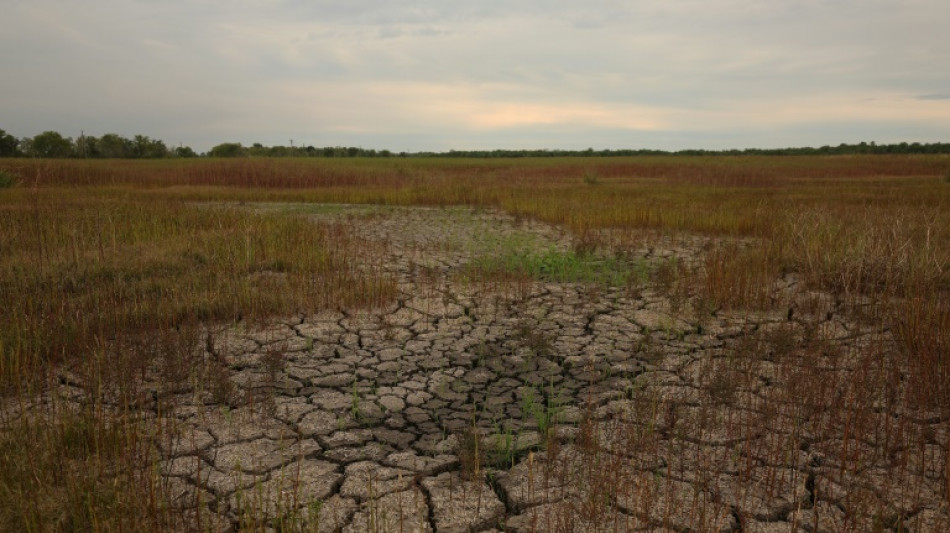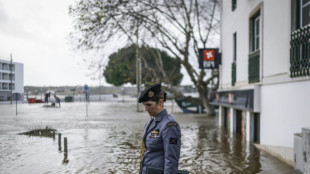
-
 France detects Russia-linked Epstein smear attempt against Macron
France detects Russia-linked Epstein smear attempt against Macron
-
Winter Olympics to open with star-studded ceremony

-
 Trump posts, then deletes, racist clip of Obamas as monkeys
Trump posts, then deletes, racist clip of Obamas as monkeys
-
Danone expands recall of infant formula batches in Europe

-
 Trump deletes racist video post of Obamas as monkeys
Trump deletes racist video post of Obamas as monkeys
-
Colombia's Rodriguez signs with MLS side Minnesota United

-
 UK police probing Mandelson after Epstein revelations search properties
UK police probing Mandelson after Epstein revelations search properties
-
Russian drone hits Ukrainian animal shelter

-
 US says new nuclear deal should include China, accuses Beijing of secret tests
US says new nuclear deal should include China, accuses Beijing of secret tests
-
French cycling hope Seixas dreaming of Tour de France debut

-
 France detects Russia-linked Epstein smear attempt against Macron: govt source
France detects Russia-linked Epstein smear attempt against Macron: govt source
-
EU nations back chemical recycling for plastic bottles

-
 Terror at Friday prayers: witnesses describe blast rocking Islamabad mosque
Terror at Friday prayers: witnesses describe blast rocking Islamabad mosque
-
Iran expects more US talks after 'positive atmosphere' in Oman

-
 US says 'key participant' in 2012 attack on Benghazi mission arrested
US says 'key participant' in 2012 attack on Benghazi mission arrested
-
Why bitcoin is losing its luster after stratospheric rise

-
 Arteta apologises to Rosenior after disrespect row
Arteta apologises to Rosenior after disrespect row
-
Terror at Friday prayers: witness describes 'extremely powerful' blast in Islamabad

-
 Winter Olympics men's downhill: Three things to watch
Winter Olympics men's downhill: Three things to watch
-
Ice dancers Chock and Bates shine as US lead Japan in team event

-
 Stellantis takes massive hit on 'overestimation' of EV demand
Stellantis takes massive hit on 'overestimation' of EV demand
-
Stocks rebound though tech stocks still suffer

-
 Spanish PM urges caution as fresh rain heads for flood zone
Spanish PM urges caution as fresh rain heads for flood zone
-
Iran says to hold more talks with US despite Trump military threats

-
 Russia accuses Kyiv of gun attack on army general in Moscow
Russia accuses Kyiv of gun attack on army general in Moscow
-
Cambodia reveals damage to UNESCO-listed temple after Thailand clashes

-
 Norway crown princess 'deeply regrets' Epstein friendship
Norway crown princess 'deeply regrets' Epstein friendship
-
Italy set for Winter Olympics opening ceremony as Vonn passes test

-
 England's Jacks says players back under-fire skipper Brook '100 percent'
England's Jacks says players back under-fire skipper Brook '100 percent'
-
Carrick relishing Frank reunion as Man Utd host Spurs

-
 Farrell keeps the faith in Irish still being at rugby's top table
Farrell keeps the faith in Irish still being at rugby's top table
-
Meloni, Vance hail 'shared values' amid pre-Olympic protests

-
 Olympic freestyle champion Gremaud says passion for skiing carried her through dark times
Olympic freestyle champion Gremaud says passion for skiing carried her through dark times
-
US urges new three-way nuclear deal with Russia and China

-
 Indonesia landslide death toll rises to 74
Indonesia landslide death toll rises to 74
-
Hemetsberger a 'happy psychopath' after final downhill training

-
 Suicide blast at Islamabad mosque kills at least 31, wounds over 130
Suicide blast at Islamabad mosque kills at least 31, wounds over 130
-
Elton John accuses UK tabloids publisher of 'abhorrent' privacy breaches

-
 Lindsey Vonn completes first downhill training run at Winter Olympics
Lindsey Vonn completes first downhill training run at Winter Olympics
-
Digital euro delay could leave Europe vulnerable, ECB warns

-
 Feyi-Waboso out of England's Six Nations opener against Wales
Feyi-Waboso out of England's Six Nations opener against Wales
-
Newcastle manager Howe pleads for Woltemade patience

-
 German exports to US plunge as tariffs exact heavy cost
German exports to US plunge as tariffs exact heavy cost
-
Portugal heads for presidential vote, fretting over storms and far-right

-
 Suicide blast at Islamabad mosque kills at least 30, wounds over 130: police
Suicide blast at Islamabad mosque kills at least 30, wounds over 130: police
-
Russia says Kyiv behind Moscow shooting of army general

-
 Greenland villagers focus on 'normal life' amid stress of US threat
Greenland villagers focus on 'normal life' amid stress of US threat
-
Iran, US hold talks in Oman after Trump military threats

-
 Stocks waver as tech worries build
Stocks waver as tech worries build
-
Dupont, Jalibert click to give France extra spark in Six Nations bid


Disasters cause $3.8 trillion in crop losses over 30 years: FAO
Natural and man-made disasters have caused $3.8 trillion in crop and livestock losses over 30 years, the UN's Food and Agricultural Organization said on Friday.
Floods, droughts, insect infestations, storms, disease and war have caused about $123 billion per year in lost food production between 1991 and 2021, the equivalent of five percent of total production or enough to feed up to half a billion people per year, the FAO said in a report.
This is the first time the UN body has tried to compile such an estimate, with the aim of putting into context the scale of the cost of disasters on both a global and personal scale.
"The international community is taking stock of the fact that disasters are... increasing tremendously... quadrupling since the 1970s" and are having an increasing impact on food production, the deputy head of FAO's statistics department, Piero Conforti, told AFP.
The FAO report, entitled "The Impact of Disasters on Agriculture and Food Security", found that disasters are increasing in severity and frequency, from 100 per year in the 1970s to around 400 events per year in the past 20 years.
- Climate change a systemic risk -
Climate change is increasingly responsible, as well as human and livestock diseases.
"Agriculture around the world is increasingly at risk of being disrupted due to multiple hazards and threats such as flooding, water scarcity, drought, declining agricultural yields and fisheries resources, loss of biological diversities and environmental degradation," said the FAO.
It identified the "systemic drivers of disaster risk" as climate change, pandemics, epidemics and armed conflicts.
The damage adds up quickly.
Average annual grain losses hit 69 million tonnes, the equivalent of France's annual production.
Some 40 million tonnes of fruit and vegetable production was lost, and 16 million tonnes of meat, dairy and eggs.
Around 23 percent of losses due to disasters were sustained in the agricultural sector.
The FAO further found that poorer nations suffered the highest losses due to extreme events in terms of the percentage of their agricultural output, at up to 10 percent.
Asia is the worst-hit region, sustaining 45 percent of total agricultural losses due to disasters, and losing the equivalent of four percent of its agricultural output.
Horn of Africa nations that are regularly impacted by drought lost an average of 15 percent of crop production.
Island developing nations have also been particularly hard hit, sustaining losses of seven percent of their agricultural output.
- Women at greater risk -
Women are also hit harder than men.
"That's because of resource constraints and structural constraints that women face in accessing things like information, financial instruments, the resources that they need to prepare to respond to or recover from disaster events," said the report's author, Zehra Zaidi.
In Pakistan, where women account for 70 percent of farm labourers, it was shown after floods that men found other work much easier than women.
Lack of sufficient data kept the FAO from calculating losses to fishing and forest production.
Despite the increasing frequency and intensity of disasters, it is possible to reduce risks to agriculture.
"There is no one size fits all solution," said the FAO's Conforti, but "there are a range of practices that can enhance the resilience of agricultural systems."
That includes agronomic techniques such as using different plant varieties and different methods to prepare the soil, as well as creating and improving warning systems.
When locusts invaded the Horn of Africa region in 2020 and 2021, early warning provided the time necessary to treat 2.3 million hectares (5.6 million acres) in the region and nearby Yemen.
Some $1.77 billion in losses in grain and dairy production was saved, the FAO estimates.
Moreover, it was extremely cost-effective, with each dollar invested in prevention measures resulted in $15 of avoided crop losses.
M.Qasim--SF-PST



